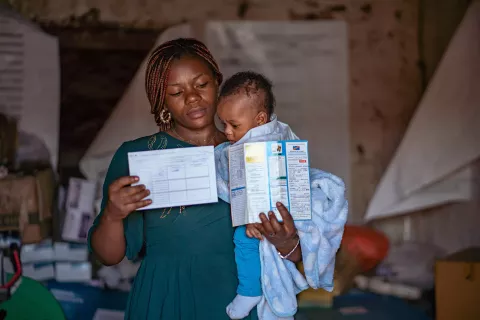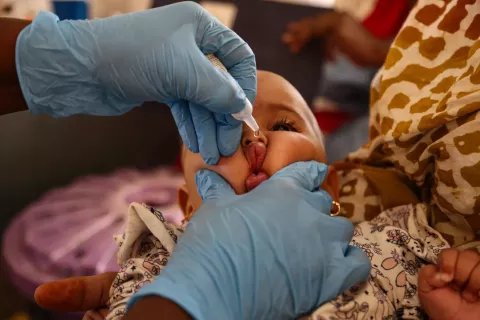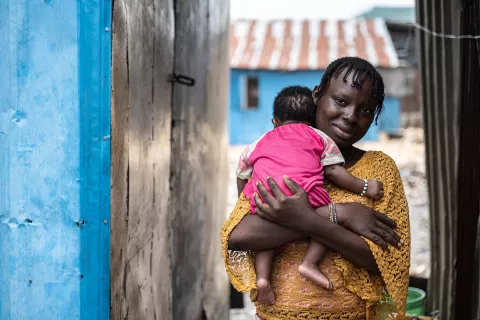“We just want the men to stop fighting”
Refugees fleeing violence in northern Cameroon find refuge in neighbouring Chad

At least 85,000 refugees have arrived around the Chadian capital N’Djamena in December, fleeing intercommunity violence in neighboring northern Cameroon. The refugees – a vast majority of whom are women, children, and elderly - recall stories of extreme violence. UNICEF is on the ground to make sure they receive lifesaving support.
Mariam Adoum was at home on the morning of December 8 when fighting reached her village. The 22-year-old pregnant mother, due in the next few days, grabbed two of her children, the ones who were around, and with her mother-in-law, they ran to the river.

“My two other children were out somewhere in the village playing, and now I don’t know what has happened to them, nor to my husband”.
Little Aziza was born the same night, in the open, on the Chadian side of the Logone River that separates the two countries. The tiny newborn was baptized on the refugee site seven days after her birth. Wrapped in a towel and a sheet to protect her from the dust, Aziza is peacefully sleeping. Her mother says she cries a lot at night, because it gets cold after the sun sets.

“A woman came by and saw that I had nothing for her, so she gave me some of her own baby’s clothes”.
The intercommunity conflict over access to shared resources (water) opposing cattle herders and fishermen communities in Cameroon broke out in August 2021 and has exacerbated since 5 December in the Logone & Chari Division of Far North Cameroon. Reports indicate that 112 villages were burnt down.
In just a few days, 85,000. refugees arrived in Chad, according to UNHCR estimates. The vast majority of them are children, and 98 per cent of the adults are women. Some 48,000 have found refuge in 18 urban sites in N’Djamena, the capital of Chad, and 37,000 people are scattered across 10 rural sites along the Chadian bank of the Logone River.
When fighting broke out, 19-year-old Honorine Hodjikem also ran away to Chad with her four children, the youngest just a few days old. While Honorine is holding the newborn, 18 months old Beatrice tries to get her mother’s attention. The boys, aged 3 and 4, are playing close by.
“My husband stayed in Cameroon to protect our belongings. I have not heard from him since we left”.

All refugees recall extremely violent clashes, leaving them with no choice but to run away for their lives by storming all available boats to cross the river. Families got separated, and dozens of children arrived in Chad alone.
“We were sitting in the classroom when we heard people yelling and everybody started to run away. I went home to find the house empty; my mother and siblings were nowhere to be found. I just followed the crowd”.
11-year-old Junior

The extremely brutal and unexpected outbreak of violence took everyone by surprise. In Chad, UNICEF is working with the local authorities, UN agencies, and NGO partners to help support the refugees with lifesaving supplies. Additionally, they are providing psychosocial care for children through child-friendly spaces; and performing identification, documentation and placement in host families of unaccompanied and separated children.




